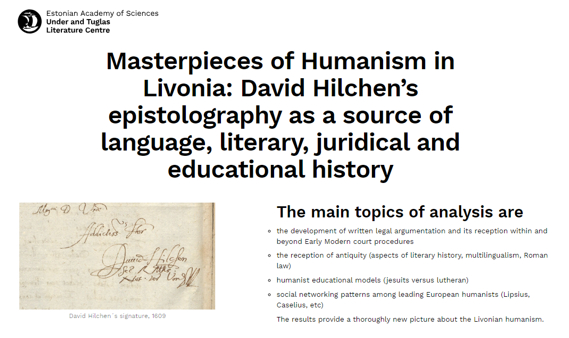As we pass from the old year into the new, EMLO’s users may find of interest the recently highlighted catalogue created for Jan Baptist Van Helmont (1579–1644). This catalogue is small yet significant: tantalizingly few letters — at present just fifteen — have survived to be recorded in the correspondence of the Flemish medic and ‘chymist’. This seems to be due, in part, to the actions of the ‘Count of Gilinius’ who, according to Van Helmont’s son Franciscus Mercurius [Francis Mercury] (1614–1699), plundered [‘spoliasset’] the letters, papers, and books that had belonged to his father and which were preserved in the family estates at Vilvorde, near Brussels.[1. See Francis Mercury van Helmont, ‘Vita authoris’, in J. B. van Helmont, Ortus medicinae, sig. (E4)v; and Sietske Fransen, ‘Jan Baptista van Helmont and his Editors and Translators in the Seventeenth Century’, PhD dissertation, Warburg Institute, University of London, 2014, p. 108.] The loss of this precious material was noted also on the far side of the English Channel in London, where Samuel Hartlib wrote in his ‘Ephemerides’:
By some bodies instigation Gleen was made to fall upon some of Helmonts houses which he plundered and set on fire, wherein many excellent writings of his perished. Amongst others a great Volume of letters written by himself and by others to him about many arcana.’[2. Samuel Hartlib, ‘Ephemerides’, 1651; see Hartlib Papers, University of Sheffield, 28/2/24B. The ‘Ephemerides’ was Hartlib’s diary and record of his many and various undertakings. Gleen, or Gilenius, was to Count Godfried (Godard) Huyn van Amstenrade (1590-1657).]

Detail from Hartlib’s ‘Ephemerides’. (Hartlib Papers, University of Sheffield, 28/2/24B)
Although Van Helmont’s letters seem to have been lost and only this minute number from what was perhaps an extensive body of work appears to survive in the correspondence archives of others, this does not prevent scholars today from enriching further the records of what is logged already in EMLO. We are delighted that Dr Georgiana Hedesan has offered to provide abstracts for Van Helmont’s known letters and to tag the people mentioned and the topics discussed therein, as well as to consider the influence and afterlife of the influential Paracelsian through the lens of the correspondences of others in the period.
In addition to enriching existing metadata (as in this example of Van Helmont), scholars are encouraged to identify and help complete significant correspondence listings for which no more than partial inventories exist in the EMLO union catalogue at present. A number of what might best be termed ‘starter catalogues’ are in the process of being identified, and students and established academics alike are invited to be in touch concerning work that might be done to help bring these to completion. A preliminary selection of the ‘starter catalogues’ will be highlighted on EMLO early in the new year and should any of these prove to be of interest and should you wish to contribute in any way, please let us know …
In the meantime, we’d like to take this opportunity to wish all users of Early Modern Letters Online a happy new year. We look forward greatly to hearing from and, we hope, working with many of you in 2019.

